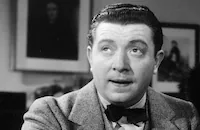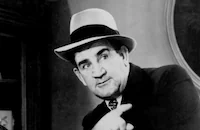Say One for Me
Brief Synopsis
Cast & Crew
Frank Tashlin
Bing Crosby
Debbie Reynolds
Robert Wagner
Ray Walston
Les Tremayne
Film Details
Technical Specs

Synopsis
In New York, Father John Conroy presides over a church in the theater district that has been nicknamed the "players' parish" because most of his parishioners are entertainers. One of his flock, old-time vaudevillian Harry LeMaise, disapproves of his unworldly daughter Holly's theatrical ambitions, preferring that she become a secretary instead. One night, Harry collapses from exhaustion and Father Conroy is called to his hospital bedside. Concerned about Holly's welfare, Harry asks the priest to look after her. To pay for her father's convalescence, Holly auditions for a job as a showgirl at a smalltime nightclub and is hired by Tony Vincent, the arrogant playboy who is producing and starring in the show. When Father Conroy learns that Holly is dancing at a low-class club, he dons his civilian clothes and, mindful of his promise to her father, goes to talk to the girl. Father Conroy takes an instant dislike to Tony's insolent jokes, and after the show, goes backstage to question Holly, who defends her decision on the grounds that she needed to take the job to pay for her father's health care. When Holly rejects Tony's romantic advances, he tracks her to her one-room apartment, but she unceremoniously throws him out. To remove Holly from the priest's influence, Tony decides to ask an old friend for a booking at the prestigious Miami Royale club in Florida. Soon after, Father Conroy pays a visit to Tony's apartment and there meets Phil Stanley, a once famous songwriter who has degenerated into a hopeless drunk and now plays the piano in Tony's act. With the blessings of the church, the father arranges to stage a nationwide television broadcast in which Hollywood's top stars will perform to raise money for the actors' home. Holly, meanwhile, convinces Sunny, an unmarried chorus girl, to have her infant son baptized by the priest. When Holly suggests Tony be the baby's godfather, Father Conroy is skeptical, but Tony is won over by the infant and accepts the honor. After the baptism, Father Conroy sees Phil drinking his breakfast and counsels him to give up alcohol and return to songwriting. Soon after, Phil gingerly approaches the priest with a new song he has just completed. When Tony learns that the owner of the Miami Royale has cancelled his engagement, he determines to secure a coveted spot on the priest's television show and thus convince the club owner to rehire him. To accomplish this, Tony schemes to manipulate Holly into falling in love with him, and then use her as a tool to win the spot. Soon after, Holly tells Father Conroy that she has fallen in love with Tony and is going to Florida with him. Although he sees through Tony's ruse, the priest offers him a slot on the show if he will agree to give up Holly. Afterward, when Holly asks Tony if he really cares for her, he stares at her in stony silence and she runs out of the room. On the night of the televised revue, Father Conroy informs Tony that he knows he is using the show as a ploy to win an engagement at the Miami Royale. Conscience-stricken, Tony takes the stage and then relinquishes his spot to showcase Phil's new song. Watching the show on television from her father's hospital room, Holly smiles when Father Conroy motions Tony on stage to join him for the final verse. Soon after, Father Conroy presides at Tony and Holly's wedding.

Director
Frank Tashlin
Cast

Bing Crosby

Debbie Reynolds

Robert Wagner

Ray Walston

Les Tremayne

Connie Gilchrist

Frank Mchugh
Joe Besser
Alena Murray

Stella Stevens
Nina Shipman

Sebastian Cabot
Judy Harriet
Dick Whittinghill
Robert Montgomery Jr.
Murray Alper
Richard Collier
David Leonard
Thomas B. Henry
Wilkie De Martel
Alexander Campbell
Bruce Mcfarlane
Madge Cleveland
Art Salter
Jamie Russell
Lee Anthony
Barry Bernard
William Graeff Sr.
Camille Williams
Eileen Maxwell
Harry Carter
Al Austin
The Steiner Brothers

Tom Kennedy
Crew
Eli Benneche
Sammy Cahn
Leonard Doss
Hugh S. Fowler
Leland Fuller
Earle Hagen
Charles Henderson
Ralph Hickey
Pete King
Charles Lemaire
Harry M. Leonard
Lionel Newman
Ben Nye
Robert O'brien
Adele Palmer
Joseph E. Rickards
Alex Romero
Walter M. Scott
Herbert Spencer
Frank Tashlin
Leo Tover
Helen Turpin
James Van Heusen
E. Clayton Ward
Lyle R. Wheeler

Film Details
Technical Specs

Award Nominations
Best Score
Quotes
Trivia
Notes
The film opens with the title song playing over a sequence in which "Holly" is rehearsing her dance for the church benefit while "Father Conroy" watches. The opening credits then roll after the priest ascends his pulpit in the church. Frank Tashlin's credit reads: "produced and directed by." Although a Hollywood Reporter production chart places Rachel Stephens, Minta Durfee and Harry Carter in the cast, their appearance in the released film has not been confirmed. According to a February 1958 Hollywood Reporter news item, Diane Varsi was set for the role of Holly and Frank Sinatra was being considered for the role of the priest.
According to studio publicity contained in the film's production file at the AMPAS Library, Crosby suggested Debbie Reynolds for the role of Holly. Studio publicity adds that the café set was built with four walls so that the camera could follow Reynolds and Wagner as they moved around the dance floor. Director Tashlin was seated at one of the tables on the set, allowing him to manipulate the action at close range. Say One for Me marked the screen debut of Stella Stevens. The picture was the last of three films in which Crosby appeared as a New York City priest. The earlier films were Going My Way (1944) and The Bills of St. Mary's (1945, see entries for both films in AFI Catalog of Feature Films, 1941-50). The church in the film was loosely based on St. Malachys in New York City, which catered to entertainers. Lionel Newman received an Academy Award nomination for his scoring of the picture.

Miscellaneous Notes
Released in United States 1959
CinemaScope
Released in United States 1959











